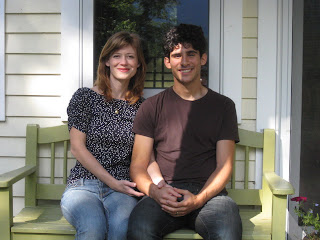Of Parietal Lobes and Love
Albert Einstein said, “Most of the fundamental ideas of science are essentially simple, and may, as a rule, be expressed in a language comprehensible to everyone.” Perhaps that’s true. But contemplating the science of the brain boggles my mind. The mental organ is so complex, according to experts, that we have no words to describe it because we have no concepts with which to imagine it, not even in science fiction.
Just ask Cristin and Ethan. They are both neuroscientists who married a week ago and spent part of their honeymoon at Fern Forest camped out in the treehouse.
Cristin recently defended her PhD thesis and is packing up to move from Philadelphia to Baltimore to live with her new husband. Ethan is doing post-doc work at Johns Hopkins University in neurotransmitters, specifically looking at causes and cures for muscular sclerosis. Cristin landed a job with the FDA in D.C., where she’ll be researching the way the brain controls neuroprostheses, the new technology for amputees. Her work is underwritten by the U.S. Army to help those who lost limbs in the war in the Middle East.
The two met in graduate school, and I can see why they fell in love. Ethan is handsomely swarthy with curly black hair. Cristin is blonde and willowy and lovely. They’re both brilliant. Brain collided with heart, and the rest is recent history.

As far as neuroscience, I know words like neurons and synapses, but I have no idea how they work. Neither do most people, even those schooled in the field. Here’s what I found on a website about neuroprostheses:
Control of prostheses using cortical signals is based on three elements: chronic microelectrode arrays, extraction algorithms, and prosthetic effectors. Arrays of microelectrodes are permanently implanted in cerebral cortex. These arrays must record populations of single- and multiunit activity indefinitely. Information containing position and velocity correlates of animate movement needs to be extracted continuously in real time from the recorded activity. Prosthetic arms, the current effectors used in this work, need to have the agility and configuration of natural arms. Demonstrations using closed-loop control show that subjects change their neural activity to improve performance with these devices. Adaptive-learning algorithms that capitalize on these improvements show that this technology has the capability of restoring much of the arm movement lost with immobilizing deficits. (http://www.annualreviews.org/doi/abs/10.1146/annurev.neuro.27.070203.144233?journalCode=neuro)
Curtsies to anyone who can interpret that for me.
I also read that when Einstein's brain was removed after his death, it was found to be missing part of a groove that runs through the parietal lobe, specifically the area that deals with mathematics and spatial reasoning. Scientists think the missing groove may have allowed neurons in that area to communicate more easily. If so, it could account for Einstein’s extraordinary talents. Sounds pretty “groovy.”
I don’t know much about MS either, except that it affects the ability of nerve cells in the brain and spinal cord to communicate with each other. No one knows what causes it—maybe a result of some combination of genetic, environmental and infectious factors.
But we didn’t sit around for four days discussing the brain. Cristin and Ethan went shopping in Burlington. They ate pizza from Cubbers and climbed Mt. Abe. They soaked in the spa. They slept in and ate a hearty breakfast every morning. In a word, they chilled. When they return to Baltimore, they’ll have plenty to do, including picking up their two dogs on the way, and Cristin wants to get her antique dress business, Stellate Reflections, going again. And there’s the business of the brain.
When they left Fern Forest, Cristin and Ethan planned to go to an orchard in Middlebury to pick apples.
“Apples are like little parietal lobes, aren’t they?” I said.
Ethan laughed. “Yeah,” he said. “Everything we see reminds us of the brain.”
The two are setting out to discover some of the brain’s mysteries, and we wish them success in their challenging research. As Einstein said, “If we knew what it was we were doing, it would not be called research, would it?”



Comments